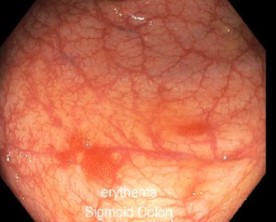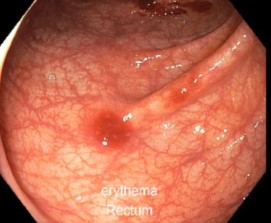Monday Poster Session
Category: Colon
P2504 - A Rare Case of Isolated AL Amyloidosis Involving the Rectosigmoid Colon
Monday, October 27, 2025
10:30 AM - 4:00 PM PDT
Location: Exhibit Hall
- BM
Brendan Martino, DO
Brooke Army Medical Center
San Antonio, TX
Presenting Author(s)
Brendan Martino, DO, John Gancayco, MD
Brooke Army Medical Center, San Antonio, TX
Introduction: Amyloidosis is a disorder characterized by extracellular tissue deposition of amyloid protein throughout the body leading to organ dysfunction. It can be characterized into systemic or localized disease as well as AL and AA amyloidosis. AL amyloidosis is usually associated with plasma cell dyscrasias. Amyloidosis involvement of the GI tract is rare, involving only 3-4% of all Amyloidosis cases with 21% of these patients having localized disease of the GI tract. The most common site of isolated GI amyloidosis is the stomach. Isolated GI amyloidosis can present in a variety of different ways or remain asymptomatic
Case Description/
Methods: 60 year old male found to have numerous erythematous 1cm flat lesions in the sigmoid colon on routine polyp surveillance colonoscopy in 2020. Biopsies showed AL amyloidosis with extensive involvement of the lamina propria and submucosa. He was completely asymptomatic. He underwent serologic evaluation by hematology without evidence of systemic AL amyloidosis. Bone marrow biopsy was also unremarkable for evidence of plasma cell disorder or amyloid deposition. He presented to the GI clinic in January 2025 with 3 months of abdominal pain and dark thin stools. He was sent for diagnostic colonoscopy which found persistent erythematous lesions in the sigmoid colon with new similar appearing lesions in the rectum. Targeted biopsies redemonstrated AL amyloidosis. He continued to have unremarkable workup for systemic disease including PET-CT. Given his localized disease, systemic chemotherapy was deferred and to continue surveillance
Discussion: Isolated AL amyloidosis of the colon is extremely rare. A 2024 systemic review of GI amyloidosis found only 15 documented cases since 1962. Diagnosis of isolated GI amyloidosis is difficult as patients can present with nonspecific symptoms or remain asymptomatic. Histologic evaluation confirms the diagnosis. Given its rarity, there are no guidelines for isolated GI amyloidosis. Management options include surgical resection, chemotherapy or symptomatic treatment and continued surveillance. It was found that surgical resection of involved bowel had high curative success rates. No standardized chemotherapy for isolated GI amyloidosis exists at present. In patients with colonic involvement who underwent surveillance there was no evidence of disease progression. In this case however it would appear that his disease has progressed. Multidisciplinary approach with GI, hematology and surgery will be needed to guide therapeutic planning.

Figure: Amyloidosis of the sigmoid colon

Figure: Amyloidosis of the rectum
Disclosures:
Brendan Martino indicated no relevant financial relationships.
John Gancayco indicated no relevant financial relationships.
Brendan Martino, DO, John Gancayco, MD. P2504 - A Rare Case of Isolated AL Amyloidosis Involving the Rectosigmoid Colon, ACG 2025 Annual Scientific Meeting Abstracts. Phoenix, AZ: American College of Gastroenterology.
Brooke Army Medical Center, San Antonio, TX
Introduction: Amyloidosis is a disorder characterized by extracellular tissue deposition of amyloid protein throughout the body leading to organ dysfunction. It can be characterized into systemic or localized disease as well as AL and AA amyloidosis. AL amyloidosis is usually associated with plasma cell dyscrasias. Amyloidosis involvement of the GI tract is rare, involving only 3-4% of all Amyloidosis cases with 21% of these patients having localized disease of the GI tract. The most common site of isolated GI amyloidosis is the stomach. Isolated GI amyloidosis can present in a variety of different ways or remain asymptomatic
Case Description/
Methods: 60 year old male found to have numerous erythematous 1cm flat lesions in the sigmoid colon on routine polyp surveillance colonoscopy in 2020. Biopsies showed AL amyloidosis with extensive involvement of the lamina propria and submucosa. He was completely asymptomatic. He underwent serologic evaluation by hematology without evidence of systemic AL amyloidosis. Bone marrow biopsy was also unremarkable for evidence of plasma cell disorder or amyloid deposition. He presented to the GI clinic in January 2025 with 3 months of abdominal pain and dark thin stools. He was sent for diagnostic colonoscopy which found persistent erythematous lesions in the sigmoid colon with new similar appearing lesions in the rectum. Targeted biopsies redemonstrated AL amyloidosis. He continued to have unremarkable workup for systemic disease including PET-CT. Given his localized disease, systemic chemotherapy was deferred and to continue surveillance
Discussion: Isolated AL amyloidosis of the colon is extremely rare. A 2024 systemic review of GI amyloidosis found only 15 documented cases since 1962. Diagnosis of isolated GI amyloidosis is difficult as patients can present with nonspecific symptoms or remain asymptomatic. Histologic evaluation confirms the diagnosis. Given its rarity, there are no guidelines for isolated GI amyloidosis. Management options include surgical resection, chemotherapy or symptomatic treatment and continued surveillance. It was found that surgical resection of involved bowel had high curative success rates. No standardized chemotherapy for isolated GI amyloidosis exists at present. In patients with colonic involvement who underwent surveillance there was no evidence of disease progression. In this case however it would appear that his disease has progressed. Multidisciplinary approach with GI, hematology and surgery will be needed to guide therapeutic planning.

Figure: Amyloidosis of the sigmoid colon

Figure: Amyloidosis of the rectum
Disclosures:
Brendan Martino indicated no relevant financial relationships.
John Gancayco indicated no relevant financial relationships.
Brendan Martino, DO, John Gancayco, MD. P2504 - A Rare Case of Isolated AL Amyloidosis Involving the Rectosigmoid Colon, ACG 2025 Annual Scientific Meeting Abstracts. Phoenix, AZ: American College of Gastroenterology.
